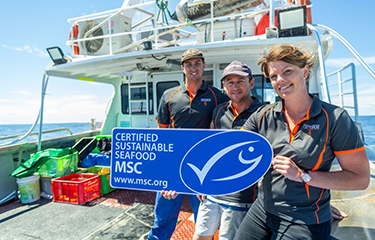First octopus fishery in the southern hemisphere earns MSC certificate

The Western Australia octopus fishery is the first of its kind in the southern hemisphere to be certified to the Marine Stewardship Council standard and the 12th fishery in Western Australia to approved under the certification program, which represents nearly 90 percent of the region’s fisheries by value.
SCS Global Services served as the certifying body, with the Western Australian Fishing Industry Council (WAFIC) acting as the client for the certification. The fishery, like all MSC-certified fisheries, was assessed against the MSC Standard, which covers three principles: Fishery stock health, fishery impacts on marine environment, and management of the fishery. SCS Global found the fishery to be well-managed with healthy stocks and effective harvest strategies in place.
“Every package of Fremantle Octopus can be tracked in detail, from ocean to plate and meets rigorous MSC Chain of Custody requirements. Fremantle Octopus already tracks our packaged octopus back to the fishing vessel, the area of coastline that it was caught and both the dates that it was caught and packaged. The MSC certification will enhance the reputation of our business and the fishery, whilst increasing demand from our local and growing export markets,” Fremantle Octopus Managing Director Glenn Wheeler said. “When a consumer buys from a retailer, or walks into a restaurant and sees Fremantle Octopus on the menu, they are confident that it is sustainably sourced with known provenance.”
The fleet targeting the fishery’s octopus (Octopus sp.) uses a trigger trap technology developed in Western Australia that reduces bycatch to 1 percent of harvest. In 2017, the octopus catch in the fishery was 189 metric tons, with the ability to sustainably increase to a 1,000 tons. The fishery currently has 32 licences and 26 vessels.
“This achievement is testament to the forward-thinking leadership within the octopus fishery, Western Australian fishing industry, and government, through the Department of Primary Industries and Regional Development (DPIRD). We applaud their joint commitment and collaboration to prove the sustainability credentials of the Western Australia octopus fishery and join the MSC’s global aspirations in transforming seafood markets to a more sustainable basis,” MSC Oceania Program Director Anne Gabriel said.
Australia now has 20 fisheries certified to the MSC Fisheries Standard, representing 28 species of fish and shellfish. Globally, 350 fisheries are MSC certified, accounting for around 15 percent of the global marine catch.
“MSC certification is international recognition of the sustainability of our unique pristine fishery and best practice fishing methodology,” Abrolhos Octopus Director Dom O’Callaghan said. “The MSC certification process is renowned for rigour and independence, which creates confidence and trust for all our clients, locally and internationally.”
Photo courtesy of the Western Australian Fishing Industry Council/Fremantle Octopus






Share